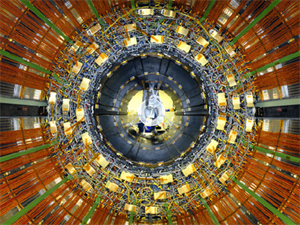



Date:23/10/18
 Chinese scientists plan to build the world's most powerful electron collider by 2030, a project that will cost 35 billion yuan ($5.05 billion), the project's leading scientist told the Global Times on Monday.
Chinese scientists plan to build the world's most powerful electron collider by 2030, a project that will cost 35 billion yuan ($5.05 billion), the project's leading scientist told the Global Times on Monday.
The location of the project has yet to be decided, Wang Yifang, director of the Chinese Academy of Sciences Institute of High Energy Physics in Beijing, told the Global Times on Monday.
"The collider will have a circumference of 100 kilometers, with a center-mass energy up to 240 giga electron-volts both setting a world record," Wang said. The collider should produce more Higgs boson particles, the essential, inevitable quarry of modern particle physics, He noted.
The conceptual design for the Circular Electron Positron Collider (CEPC) passed international examinations in September, Wang said.
The collider will provide light at a million electron-volt power level, creating the most advanced conditions for research on new materials and nuclear physics, Wang explained.
Scientists from the US, Europe and Japan have participated in designing the project, will work on the building process and conduct research with the collider, Wang said.
In a bid to maximize the project's service life, scientists are mulling upgrading the electron positron collider around 2040 into a proton collider, Wang noted.
By then, the center-mass energy for the CEPC will have reached about 100 tera electron-volts, seven times as powerful as the Large Hadron Collider (LHC) in Switzerland, Wang said.
The Swiss project near Geneva is the world's largest and most powerful particle collider and reportedly the largest machine in the world.
Fears have also mounted over the development of the huge collider. Some Western media said there's a chance the colliders could cause a catastrophe that engulfs space itself.
It was "groundless and with no scientific basis" to speculate that a collider could create a black hole that puts lives at risk, Wang said. "Powerful cosmic rays and nuclei clash daily on Earth at forces a million times stronger than those created in any lab."
"Similar concerns were raised before the LHC began running in Europe and time has proven its safety," he said.
China to build world’s largest supercollider
 Chinese scientists plan to build the world's most powerful electron collider by 2030, a project that will cost 35 billion yuan ($5.05 billion), the project's leading scientist told the Global Times on Monday.
Chinese scientists plan to build the world's most powerful electron collider by 2030, a project that will cost 35 billion yuan ($5.05 billion), the project's leading scientist told the Global Times on Monday.The location of the project has yet to be decided, Wang Yifang, director of the Chinese Academy of Sciences Institute of High Energy Physics in Beijing, told the Global Times on Monday.
"The collider will have a circumference of 100 kilometers, with a center-mass energy up to 240 giga electron-volts both setting a world record," Wang said. The collider should produce more Higgs boson particles, the essential, inevitable quarry of modern particle physics, He noted.
The conceptual design for the Circular Electron Positron Collider (CEPC) passed international examinations in September, Wang said.
The collider will provide light at a million electron-volt power level, creating the most advanced conditions for research on new materials and nuclear physics, Wang explained.
Scientists from the US, Europe and Japan have participated in designing the project, will work on the building process and conduct research with the collider, Wang said.
In a bid to maximize the project's service life, scientists are mulling upgrading the electron positron collider around 2040 into a proton collider, Wang noted.
By then, the center-mass energy for the CEPC will have reached about 100 tera electron-volts, seven times as powerful as the Large Hadron Collider (LHC) in Switzerland, Wang said.
The Swiss project near Geneva is the world's largest and most powerful particle collider and reportedly the largest machine in the world.
Fears have also mounted over the development of the huge collider. Some Western media said there's a chance the colliders could cause a catastrophe that engulfs space itself.
It was "groundless and with no scientific basis" to speculate that a collider could create a black hole that puts lives at risk, Wang said. "Powerful cosmic rays and nuclei clash daily on Earth at forces a million times stronger than those created in any lab."
"Similar concerns were raised before the LHC began running in Europe and time has proven its safety," he said.
Views: 382
©ictnews.az. All rights reserved.Similar news
- Azerbaijani project to monitor disease via mobile phones
- Innovative educational system to be improved under presidential decree
- NTRC prolongs license of two TV and radio organizations for 6 years
- Azerbaijan establishes e-registry for medicines
- Azerbaijani museum introduces e-guide
- Nar Mobile opens “Nar Dunyasi” sales and service center in Siyazan city
- International conference on custom electronic services held in Baku
- OIC secretary general to attend COMSTECH meeting in Baku
- Azerbaijan develops earthquake warning system
- New law to regulate transition to digital broadcasting in Azerbaijan
- Azerbaijani State Social Protection Fund introduces electronic digital signature
- Intellectual traffic management system in Baku to be commissioned in December
- Tax Ministry of Azerbaijan started receiving video-addresses
- World Bank recommends Azerbaijan to speed up e-service introduction in real estate
- Azerbaijan to shift to electronic registration of real estate





















